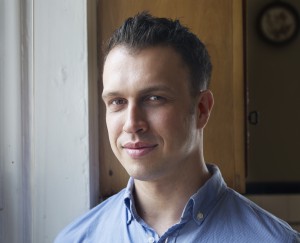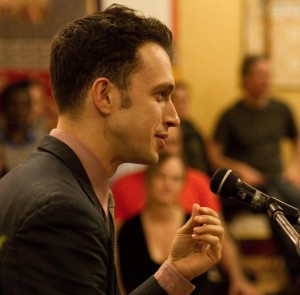Tuesday
Featured StoriesThe Road Home: An Interview with Shastri Ethan Nichtern
Shastri Ethan Nichtern talks with Dan Glenn of the Shambhala Times about his third book, The Road Home (North Point Press), which comes out today.
First thing’s first: this book is really good! I was really inspired, touched, and opened by your book in ways I didn’t expect to be.
I wanted to write an overview book that’s very contemporary but also has a core emotional resonance in terms of what the path is to me. The idea behind the book was to write almost a Thich Nhat Hanh: Heart of the Buddha’s Teaching-kind of book from the Shambhala perspective, although bringing in other perspectives as well, and with a heartfelt resonance. This notion of home was really that resonance for me. I don’t think we need more dharma books, I think we need more applied dharma and dharma relationships–so I’m a little skeptical about new dharma books as well. But I felt like I wanted to take a shot at writing an overview of the teachings from this place. So what I was going for from the standpoint of a Buddhist book was something that stays true to traditional teachings and lays out a clarity and structure while at the same time tries to go at some new angle of what we’re really trying to do on the path.
There’s a sense of personal exposure in this book, a willingness to be vulnerable, which struck me as brave and as a teaching in and of itself. You talk about being bullied, crying on an airplane, and having an anxiety around expressing yourself when speaking publicly. Was that intentional, or does that just get woven in naturally?
This notion of being lost in commute, wondering where home is, and this really sad, tragic possibility that we all face of just spending our entire long-but-very-short life thinking we’re going to get somewhere where we belong and feel at home has a lot of resonance for me. This notion of, “Where is home?” has been a very core question for me. I think the Buddhist path is saying, “Your heart and mind has to be your home, because every home is going to be temporary and unstable.” I think that’s something everyone can relate to.
There is a real vulnerability in the question of what life is really about. Is it about chasing objects and experience? Or is it, in the words of Trungpa Rinpoche, making friends with our true home–our heart and mind–and building sacred relationships out of that? If you really get into the questions that the Shambhala teachings are asking, like “What is basic goodness?” or “What is suffering?” it’s asking you to be very personal. You’re going right to the heart of experience.
I think as Westerners we have to realize we’re inheriting a spiritual tradition with a lot of cultural paradigms and if we’re insecure about ourselves there can be a lot of momentum or a lot of longing to take on a foreign culture. But I think we have to take on the teachings, and be who we are. That’s something I see with a lot of my mentors and heroes in our tradition is that as they grow older they seem to just become more and more relaxed with who they are. The other option is to suppress one’s humanity and I just know that doesn’t work. Every time I go down that path it feels very robotic and, at the end of the day, unskillful.
One thing that really came across for me is how important a “contemporary exploration of the Buddhist path” really is–the fact that there is nothing in the sutras on internet porn or that “mindful speech” originally only had to cover verbal speech and now we this vast array of modes of communication.
I really feel that as the Shambhala tradition develops more and more, our mandate and ideal is to be somebody who’s “in the world.” The mandate of this path is worldly enlightenment. Our tradition completely reframes the notion of an awakened being to an awakened leader in the world: the Rigden principle. That’s who we “idealize”–this being that is a Buddha, but a worldly Buddha. It’s hard to really hold both of those, that I can be awake and in the world at the same time.
We’re exploring the ethics of right now. So, a question like internet porn–that’s the ethical question of sexual conduct, or that’s one of them at least. It’s not whether to be a monastic or not a monastic, it’s how we communicate in sexual relationships. Teachers in Shambhala should be able to teach people about the Right Speech of text messaging, because that’s what our communication is. I think we have to say, “If you are a practitioner of worldly awakening and you don’t know what happened in the world today, you’re behind.” At the same time, I think we do have to preserve the retreat tradition of really deepening. I hear the Sakyong talking about this a lot: we have to really stretch in both directions. That’s what I think the Rigden principle is: your practice is deeper and you’re even more of the world than somebody who’s never heard of the teachings. It’s obviously a challenge, but it’s a challenge I like.
I love the term you use: “Awake-ism.” Something about it feels so much more fresh, culturally relevant, and relatable than the term Buddhism. I know it’s just a simple translation, but you might really be on to something here!
My understanding–and I’ve read some different articles on this–is that even the word “Buddhism” was really a Western translation later on. It was really called the path, or the way, or the dharma. The world we live in tries to divide spiritual and secular. You might think that something is a religion, but then see that all the important conversations in the world are happening in the secular realm–and they really are–you wonder why we are making these divisions. The way that society is divided right now between secular and religious, I would say it’s incredibly dubious to put what the Buddha taught in the religious category. The Shambhala approach is to say that this distinction doesn’t really exist. So a really interesting thing happens when you translate this word–which really is a made-up word to begin with, a combination of Sanskrit and English–into Awake-ism, it does feel fresh. I’m constantly fascinated by how much language either opens experience or cuts off an experience.
Who did you see as your audience when writing this book? It seems like people in the under-forty crowd will definitely relate, but I’m almost tempted to give this to my parents and say, “Here’s a really down-to-earth, culturally relevant expression of what my path is about.”
I’m more interested in contemporary expressions than expressions for “young people.” It’s never about “how do we speak to the young people” but how do we make this relevant? I think the audience is meant to work on a lot of levels. For the Shambhala community, it’s an overview book that is intended to try to offer some clarity to some Buddhist concepts that people have that may not have landed fully. I was also thinking about the mindfulness movement taking off, and from that standpoint wanting to say that mindfulness is great, but it’s actually the tip of the iceberg. The mindfulness movement needs “Awake-ism” or Buddhism, but its not going to come to it unless it’s secular and accessible, so I’m trying to bridge that gap as well. I think this is a moment in time where Buddhists and the Shambhala community can really grab that interest and say, “That’s all great, but it’s actually much deeper and much broader than that.”
You have quite an extensive tour set up for this spring. How are you feeling about that?
A lot of the events are at Shambhala Centers, where I’ve taught and visited and have friends, so I’m excited to go back to those places. So, if folks are reading this and near a Shambhala Center where I’m going to be, I’d love to see you there. Unless you have something better going on, which is completely possible.
~~
Ethan Nichtern is a senior teacher in the Shambhala Buddhist tradition as well as the author of One City: A Declaration of Interdependence. He is also the founder of The Interdependence Project, a nonprofit organization dedicated to secular Buddhist study and Transformational Activism. Shastri Nichtern has taught meditation and Buddhist studies classes and retreats across the United States since 2002.




















May 8, 2015
Reply
Excellent….reminds me of a story of charming Bees and dancing naked in tents in the desert. It’s not burning man, either….Its the story of the Holy Land.